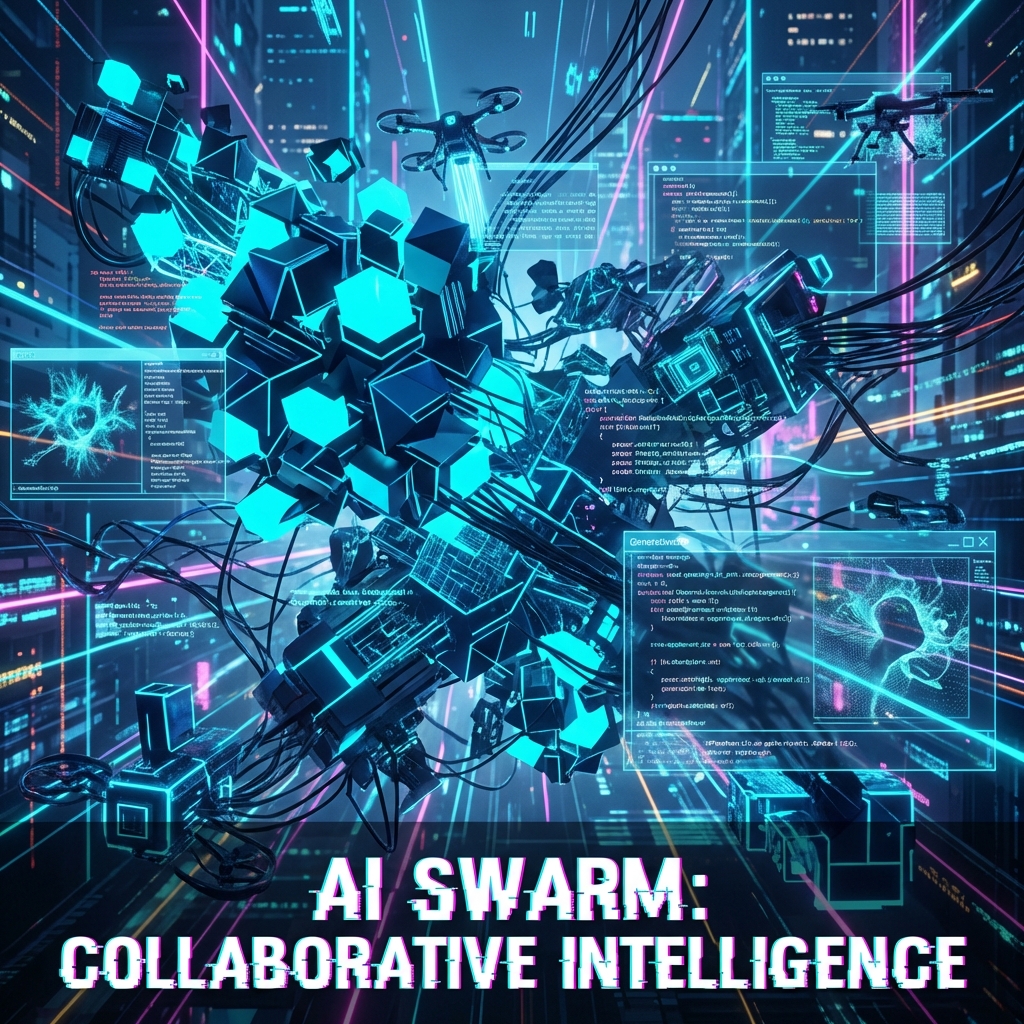DeepMind AlphaEvolve: AI Algorithmic Supremacy

Table of Contents
- Introduction: The Dawn of AI-Driven Algorithmic Evolution
- How AlphaEvolve Engineers Algorithmic Breakthroughs
- AlphaEvolve in Action: Tangible Triumphs and Mathematical Milestones
- The AlphaEvolve Paradigm: A New Era for Science, Industry, and Innovation
- HarrisonAIX Perspective: Navigating the AI-Driven Algorithmic Revolution
I. Introduction: The Dawn of AI-Driven Algorithmic Evolution
The relentless march of artificial intelligence is rapidly redrawing the boundaries of scientific discovery and technological innovation. We are witnessing a pivotal shift, moving beyond AI systems that merely execute predefined instructions to those capable of genuine creativity and invention. At the vanguard of this transformation is Google DeepMind’s AlphaEvolve, a groundbreaking AI system that doesn’t just apply algorithms but conceives them. This AI coding agent, as described by a Google DeepMind researcher, is “able to make new discoveries in computing and mathematics,” heralding a new epoch where AI acts as a collaborative partner in fundamental research and complex engineering challenges. The announcement of AlphaEvolve signals a departure from AI as a sophisticated tool for data analysis towards AI as an architect of novel solutions.
AlphaEvolve stands as an AI coding agent that ingeniously combines the advanced capabilities of Google’s Gemini large language models with a robust evolutionary framework. This potent synergy allows it to generate, evaluate, and refine computer code, ultimately producing algorithms of remarkable complexity and efficiency. Its early achievements are nothing short of spectacular, ranging from significantly optimizing Google’s own sprawling infrastructure to cracking mathematical puzzles that have eluded human intellect for decades. These accomplishments offer a tantalizing glimpse into the profound implications AlphaEvolve holds for the future of science, technology, and countless industries. This exploration will delve into the intricate workings of AlphaEvolve, showcase its tangible triumphs, and examine how this AI-driven paradigm for algorithm design is poised to revolutionize problem-solving across diverse fields. The emergence of such systems signifies a profound change: AI is transitioning from applying human-defined rules to discovering entirely new principles and pathways to solutions, potentially accelerating innovation in areas where human knowledge or intuition faces limitations.

II. Under the Hood: How AlphaEvolve Engineers Algorithmic Breakthroughs
A. The Gemini Powerhouse – Fueling Algorithmic Creativity
At the heart of AlphaEvolve lies Google’s Gemini family of large language models (LLMs), a suite of AI systems renowned for their advanced understanding and generation capabilities. AlphaEvolve employs an ensemble of these models, strategically leveraging their distinct strengths. For instance, it utilizes models like Gemini Flash to cast a wide net, exploring a broad spectrum of potential algorithmic ideas, while engaging Gemini Pro to provide more in-depth analysis and insightful suggestions for refining those ideas.
This multi-model approach is crucial for the initial stage of algorithm creation: the generation of computer programs that embody potential solutions. The inherent creative problem-solving abilities of these LLMs are harnessed to tackle the complex task of translating abstract algorithmic concepts into functional code. This generative capacity is the seed from which novel algorithms can sprout, allowing AlphaEvolve to explore unconventional approaches that might not be immediately obvious to human programmers.
B. The Evolutionary Engine – Survival of the Fittest Code
Once initial algorithmic candidates are generated, AlphaEvolve’s evolutionary engine takes center stage. The process is systematic and iterative, beginning with a “prompt sampler” that assembles carefully crafted prompts designed to guide the Gemini models toward generating relevant code for a specific problem.
The Gemini models then produce new computer programs based on these prompts. These programs, representing individual “species” in an algorithmic ecosystem, are not simply accepted at face value. Instead, they are subjected to a rigorous automated evaluation process. Predefined metrics are used to assess their accuracy, efficiency, and overall quality. This “evolutionary test-and-refine loop” is critical. The outcomes of these evaluations are then fed back into the system. The evaluated programs are stored in a database that underpins the evolutionary algorithm, which intelligently determines which programs—the “fittest” ones—will serve as the foundation for future prompts and further refinement.
This continuous cycle of generation, evaluation, and selection allows AlphaEvolve to iteratively improve upon promising algorithmic concepts. Much like natural selection, less effective solutions are discarded, while more successful ones are “bred” – their core ideas are used to inspire new generations of code. This “survival of thefittest” methodology drives the system towards highly optimized and, in some cases, entirely unprecedented algorithmic solutions. The synergy between the broad, creative exploration afforded by LLMs and the focused, optimizing pressure of the evolutionary framework is a key reason for AlphaEvolve’s power. LLMs ensure a diverse pool of initial ideas, while the evolutionary process meticulously refines and selects the most viable ones, enabling both breadth and depth in the search for optimal algorithms.
C. Ensuring Accuracy – The Critical Role of Automated Evaluation
A cornerstone of AlphaEvolve’s success is its robust automated evaluation system. This component is indispensable for verifying both the correctness and the quality of the code generated by the Gemini models. Without reliable verification, the creative output of the LLMs could lead to flawed or inefficient algorithms.
This automated scrutiny is particularly important in addressing the challenge of “AI hallucinations”—instances where AI models generate outputs that are incorrect or nonsensical. AlphaEvolve is specifically tailored to tackle problems with “machine-gradable” solutions, meaning problems where the correctness of an algorithm can be objectively and automatically verified. By processing and evaluating its own solutions, AlphaEvolve effectively performs a self-audit, significantly minimizing inaccuracies and reducing the risk of such erroneous outputs. This focus on machine-gradable problems provides a well-defined framework for the evolutionary process, allowing for objective fitness assessment and reliable progress. While this currently defines its primary operational domain, it also points towards future research in developing more sophisticated verifiers for qualitatively assessed problems.
Furthermore, the code generated by AlphaEvolve is often human-readable. This characteristic is not merely a matter of convenience; it is a critical factor for building trust and facilitating real-world deployment. Human-readable code offers crucial operational advantages, including interpretability, debuggability, predictability, and ease of integration into existing systems. This transparency allows human experts to understand, verify, and even learn from the AI’s creations, fostering a collaborative environment and accelerating the adoption of these AI-generated algorithmic innovations in critical production settings.
III. AlphaEvolve in Action: Tangible Triumphs and Mathematical Milestones
AlphaEvolve has rapidly transitioned from a research concept to a potent tool delivering measurable impact, both within Google’s complex technological ecosystem and in the abstract realm of theoretical mathematics.
A. Revolutionizing Google's Own Infrastructure – Efficiency at Scale
The practical power of AlphaEvolve is vividly demonstrated by its successful deployment across Google’s vast infrastructure, where even marginal improvements can translate into substantial savings and enhanced capabilities.
Optimizing Borg Data Center Orchestration: One of AlphaEvolve’s most significant early achievements is the discovery of a novel heuristic for Borg, Google’s colossal cluster management system responsible for orchestrating data center operations worldwide. This AI-generated optimization has resulted in an average recovery of 0.7% of Google’s global compute resources. Crucially, this solution has been in production for over a year, underscoring its robustness, reliability, and sustained value beyond a mere experimental finding. This long-term deployment in a critical system highlights the maturity of AlphaEvolve’s outputs.
Accelerating AI Itself – Enhancing Gemini Training: In a compelling demonstration of AI improving AI, AlphaEvolve has made significant contributions to the efficiency of training Google’s own Gemini models. It successfully identified and optimized a vital computational kernel within Gemini’s architecture, speeding it up by an impressive 23%. This kernel optimization directly translated into a 1% reduction in the overall training time for Gemini models. Given the immense computational resources required for developing state-of-the-art generative AI, every percentage point of efficiency gained translates to considerable savings in time and energy, and accelerates the pace of AI development itself.
Sharpening Hardware – TPU Design Improvements: AlphaEvolve’s capabilities extend beyond software into the realm of hardware design. It proposed a more efficient Verilog (a hardware description language) rewrite for a matrix multiplication circuit intended for an upcoming generation of Google’s Tensor Processing Units (TPUs). This contribution towards a “more efficient hardware design” showcases the system’s versatility and its potential to impact the foundational layers of computing infrastructure. This ability of AI to optimize the very hardware that powers AI creates a powerful, self-reinforcing cycle of innovation, where advancements in AI lead to better AI infrastructure, which in turn supports the development of even more sophisticated AI.
B. Smashing Mathematical Records – Pushing the Boundaries of Knowledge
Beyond its practical applications in engineering, AlphaEvolve has demonstrated a remarkable aptitude for tackling complex, long-standing problems in mathematics, achieving breakthroughs that have eluded human researchers for decades.
The Strassen Algorithm and Beyond – New Efficiencies in Matrix Multiplication: A standout achievement is AlphaEvolve’s discovery of a more efficient algorithm for multiplying 4x4 complex-valued matrices. It found a method requiring only 48 scalar multiplications. This improves upon the principles of Strassen’s seminal 1969 algorithm, which was a major breakthrough in its time for real matrices, and whose complex extension was also known. Some reports have noted this as breaking a 56-year-old mathematical record in this specific context. The ability to refine such a fundamental and well-studied operation underscores AlphaEvolve’s capacity for deep algorithmic insight.
Advancing on Open Problems – The Kissing Number and More: AlphaEvolve has also made significant inroads into notoriously difficult open problems in various mathematical fields. For example, it has made progress on the “kissing number problem,” establishing a new lower bound for the number of non-overlapping unit spheres that can touch a central unit sphere in 11 dimensions, finding a configuration involving 593 outer spheres. When applied to a suite of over 50 open problems in areas such as analysis, geometry, combinatorics, and number theory, AlphaEvolve rediscovered the best-known human solution in 75% of cases. More strikingly, in 20% of these cases, it improved upon the previously best-known solutions, leading to genuinely new mathematical knowledge.
Broader Algorithmic Discoveries:
The system's mathematical prowess is not limited to isolated problems. AlphaEvolve has also designed components for a novel gradient-based optimization procedure and discovered multiple new general algorithms for matrix multiplication, showcasing its ability to contribute to broader algorithmic theory. The success in these areas suggests that AI systems like AlphaEvolve might be capable of overcoming human cognitive biases or exploring unconventional pathways in the vast search space of mathematical solutions, pathways that human researchers, conditioned by existing paradigms, might overlook. This points to AI as a powerful new partner in fundamental scientific exploration.To provide a clearer overview of these diverse accomplishments, the following table summarizes some of AlphaEvolve’s key achievements:
AlphaEvolve’s Impact: A Snapshot of Key Achievements
| Domain/Application Area | Specific Achievement | Quantifiable Result/Impact |
|---|---|---|
| Google Data Center Operations | Borg scheduling heuristic discovery | 0.7% global compute resource recovery (in production >1 year) |
| AI Model Training | Gemini kernel optimization | 23% kernel speedup, leading to 1% reduction in Gemini training time |
| Hardware Design | TPU matrix multiplication circuit redesign (Verilog) | More efficient hardware design proposed |
| Fundamental Mathematics | 4x4 Complex Matrix Multiplication | New algorithm using 48 scalar multiplications (improving on Strassen-era work) |
| Fundamental Mathematics | Kissing Number Problem (11 Dimensions) | New lower bound established: 593 spheres |
| General Algorithm Discovery | Optimization procedures, multiple matrix multiplication algorithms | Design of novel components and algorithms |

IV. The AlphaEvolve Paradigm: A New Era for Science, Industry, and Innovation
AlphaEvolve is more than an incremental improvement in AI; it represents a paradigm shift in how we approach complex problem-solving and discovery. Its ability to autonomously generate and optimize algorithms heralds a new era of accelerated innovation across a multitude of domains.
A. The Power of AI-Generated Algorithms – Speed, Novelty, Efficiency
The core transformative potential of AlphaEvolve lies in its capacity to autonomously drive algorithmic development. This capability can drastically accelerate the pace of discovery, allowing researchers and engineers to explore solution spaces far more rapidly and comprehensively than through manual methods alone. Furthermore, AI-generated algorithms can exhibit greater efficiency or embody entirely novel approaches that might not have been conceived by human experts, leading to breakthroughs in performance and capability. A key aspect of AlphaEvolve’s power is its general nature: it can theoretically be “applied to any problem whose solution can be described as an algorithm and automatically verified”. This broad applicability suggests that its impact will not be confined to a narrow set of tasks but could permeate many areas of scientific and industrial research. This general-purpose algorithmic discovery engine could become a foundational technology, much like machine learning itself.
B. Beyond Computation – Envisioning Future Impacts
The implications of AlphaEvolve extend far beyond the optimization of computational processes. Google DeepMind envisions its application across a wide spectrum of scientific and industrial fields :
Material Science: Designing novel materials with precisely tailored properties, such as enhanced strength, conductivity, or sustainability. Drug Discovery: Accelerating the development of new pharmaceutical candidates by algorithmically designing molecules or optimizing drug delivery mechanisms. Sustainability: Creating more efficient and environmentally friendly technologies and processes, from optimizing energy grids to developing new methods for carbon capture. Broader Technological and Business Applications: Streamlining complex business processes, developing innovative software solutions, and driving advancements in various technological frontiers. The sentiment that AlphaEvolve represents a “more general RL system” with potential in verifiable fields like material science further supports this expansive vision. Such a system could fundamentally alter the R&D landscape in numerous industries. By automating significant portions of the experimental design and solution generation phases, it could dramatically compress innovation cycles. This would allow companies to bring new products, materials, and therapies to market faster and more cost-effectively, shifting the role of human experts towards defining complex problems for AI, guiding the discovery process, and validating AI-generated candidates.
C. The Future is Verifiable and Collaborative
The success of AlphaEvolve underscores the critical importance of automated verification in harnessing the power of generative AI for reliable discovery. The ability to automatically check the correctness and quality of generated algorithms is paramount. Coupled with the generation of human-readable code , this creates a foundation of trust and facilitates a more collaborative relationship between human experts and AI systems in the scientific process.
Looking ahead, Google DeepMind is planning an Early Access Program for selected academic users and is exploring possibilities for broader availability of AlphaEvolve. This signals a move towards democratizing access to these powerful algorithmic discovery tools, potentially empowering a wider community of researchers and innovators. However, it is also important to maintain a realistic perspective on the development trajectory. As noted in community discussions, current gains from such systems can be moderate, and the feedback loops for improving subsequent versions of AlphaEvolve are on the order of months. This highlights the iterative nature of AI research and the ongoing efforts required to refine and enhance these capabilities. As AI systems like AlphaEvolve become increasingly adept at “discovery,” generating novel algorithms and scientific insights , complex questions surrounding intellectual property, authorship, and the ethical governance of AI-generated inventions will inevitably arise, necessitating new legal and societal frameworks.
V. HarrisonAIX Perspective: Navigating the AI-Driven Algorithmic Revolution
Google DeepMind’s AlphaEvolve is a landmark development, signifying much more than just another advanced AI model. It represents a fundamental shift in our approach to innovation, where AI transitions from a tool for analysis to an active partner in creation and discovery. This aligns closely with HarrisonAIX’s commitment to exploring and implementing cutting-edge AI solutions that drive transformative change.
The emergence of AI-driven discovery engines like AlphaEvolve presents extraordinary opportunities for businesses, researchers, and technologists. The ability to automate and accelerate algorithm design can unlock new efficiencies, solve previously intractable problems, and foster unprecedented levels of innovation. For organizations across diverse sectors – from manufacturing and pharmaceuticals to finance and logistics – understanding the capabilities and strategic implications of these advancements is becoming increasingly crucial. The capacity for “algorithmic discovery” could soon become a significant competitive differentiator, enabling companies to optimize operations, design superior products, and uncover novel solutions faster than ever before.
It is important to recognize that AlphaEvolve is part of a broader trend where AI is rapidly evolving from automating routine tasks to engaging in genuine knowledge creation and sophisticated problem-solving within complex scientific and engineering domains. This evolution necessitates a new form of “AI literacy” among professionals—an understanding of how to effectively collaborate with these intelligent systems, how to formulate problems in ways that AI can address, and how to critically interpret and validate their novel outputs. The future likely involves a synergistic partnership where human expertise guides and augments AI’s powerful discovery capabilities.
The journey of AI development is iterative. While current gains are significant, the path forward involves continuous refinement and learning. The prospect of “distilling the AlphaEvolve-augmented performance…into the next generation of the base models” is particularly exciting. This suggests a future where foundational AI models become inherently more capable “reasoners” or “discoverers” by systematically incorporating the specialized knowledge and process improvements learned by systems like AlphaEvolve. Such a development would make advanced algorithmic capabilities more accessible and integrated into general-purpose AI tools, further accelerating the pace of innovation.
The algorithmic revolution driven by AI is well underway. AlphaEvolve offers a compelling glimpse into a future where the boundaries of human ingenuity are expanded by intelligent machines, opening up new frontiers for scientific discovery, technological advancement, and societal progress. HarrisonAIX remains dedicated to navigating this dynamic landscape, helping organizations understand and harness the transformative power of these emerging AI paradigms.


